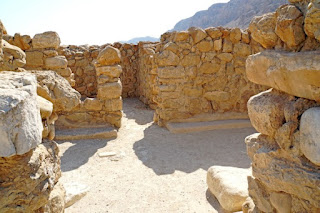Archaeology and Fact-Checking the Bible
A term that has become common in recent years is fact check, predominantly used in political matters. It seems that fact-checking organizations (as well as individuals) are bolstered by appeals to their authority and popularity — as well as those who want their biases confirmed.
Who checks the checkers? The Snopes site was outstanding for looking up information and refuting silly urban legends, but it became disingenuous when supporting leftist politics. The FactCheck outfit claims that Snopes is reliable (this post has a mix of good and bad information, but supports leftist sources), but they are biased themselves. Negative biases are used when fact-checking the Bible using archaeology.
 |
| Study room at Qumram, Israel - Flickr / Dennis Jarvis (CC BY-SA 2.0) |
People use archaeology like they use tendentious claims of the secular science industry to justify their rejection of the Bible. The articles below contain an important truth: Discoveries in archaeology have not disproved biblical history, nor can archeology prove the Bible. They consistently affirm its historical accuracy, however. You savvy?
As discussed previously, unbelievers and liberal churchians set up archaeology as a supreme authority. "There is no archaeological evidence that the Hittites existed, therefore, the Bible is wrong!" That is a risible argument from silence, yet allegedly thinking people use such reasoning. In addition, dating methods used in archaeology are skewed according to old-earth assumptions, leading to conflicts with known history (see "Dating Methods, Archaeology, and the Bible"). Less hubris and a "wait and see" attitude are warranted.
A few "gotchas" use those dubious dating methods and deplorably-incomplete information. These include when camels were introduced to Israel (see "Camels, Carbon Dating, and the Bible"), claims that Yahweh had Asherah as a wife or girlfriend but priests changed the historical record, and how Israel was not as advanced as indicated in the Bible. We can't let the machinations of these tinhorns shake our faith!
With the advent of archaeology, we can investigate the Bible’s claims about ancient history in a way that people at earlier points could not. Sometimes, the results include clear-cut evidence in support of the Bible’s description of people, places, and events; however, it is not always obvious, and we need to be prepared to think about the evidence more critically. Even so, when we approach the evidence from a stance of confidence in biblical authority, we see that archaeology overwhelmingly supports the Bible’s accuracy.
To read the full article, dig into "Fact-Checking the Bible." Be sure to come back for the next section.
As Christians, we presuppose the existence of God and miracles. (We wouldn't be Christians if we didn't.) It is vitally important to believe the inerrancy of the Biblical manuscripts, which are continually affirmed in various branches of science. The secular science industry presupposes atheistic naturalism, so anything that affirms the Creator, biblical truth, and the miraculous tend to be rejected out of hand — then they stand there looking puzzled like my prospector friend Stormie Waters when there's no gold nuggets in her pan. "Why is the evidence contrary to our worldview?" You won't allow it, old son, because it consistently points to God.
 |
| Belshazzar's Feast, Rembrandt Harmenszoon van Rijn, 1635 |
Secular archaeologists are particularly stymied by fulfilled prophecies, some of which were on a large scale and fulfilled hundreds of years before the events. Using naturalistic presuppositions and lack of evidence, they contrive rescuing devices in efforts to explain away miraculous events.
C.S. Lewis defined a miracle as “an interference with Nature by supernatural power.” The Bible, of course, is replete with “ interferences” by the God of Scripture. We immediately think of events such as the creation of the universe out of nothing, the global flood, the parting of the Red Sea, the walls of Jericho collapsing, Lazarus being raised from the dead, and so on. Since the infinite God of creation is speaking in the Bible, we can have absolute confidence that his revelation is both trustworthy and true. There is no higher authority to whom we can appeal. But without a willingness to accept God’s Word as accurate and authoritative, people’s worldview will inevitably be skewed by their very limited and fallen perspective.
You can finish reading this article at "Archaeology: Missing the Miraculous."